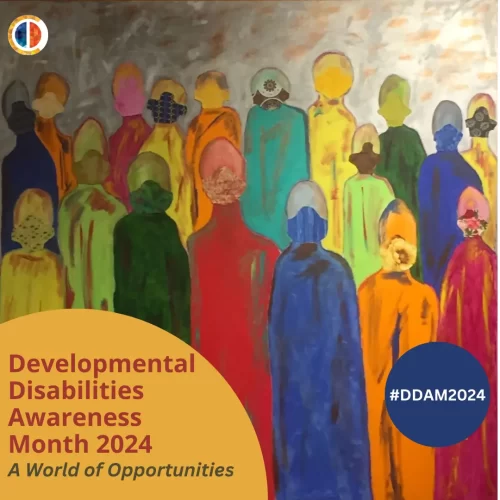How to Celebrate March Developmental Disabilities Awareness Month
Every March, multiple organizations come together to help raise awareness of the needs and potential of individuals with developmental disabilities. Developmental Disabilities Awareness Month (DDAM) was first created in 1987, when President Ronald Reagan recognized the month to highlight ways that people with and without disabilities can unite to form strong, diverse communities.
Autism is a neurodevelopmental disorder and is one of the developmental disabilities defined as impairments in physical learning, language, or behavior areas, but is not the only one.
According to the Centers for Disease Control and Prevention, developmental disabilities examples include:
- Autism spectrum disorders
- Cerebral palsy
- Attention-Deficit/Hyperactivity Disorder
- Learning or intellectual disabilities
- Vision impairment
- Hearing Loss
- Other neurodevelopmental disorder or developmental delays, such as Down syndrome

For 2024, the Developmental Disabilities Awareness Month partners created the theme of “A World of Opportunities.” It was chosen as organizations like National Association of Councils on Developmental Disabilities have the mission of celebrating people and working together to remove obstacles. They say, “Our goal is to build a community that’s committed to creating a world where everyone can do well and succeed. Join us in making a world where all kinds of people have the chance to thrive.”
Every kind of neurodiversity comes with its own problems and challenges, and it’s good to have some help with it. This month is a reminder that it’s okay to ask for support and assistance if you are the one with a disability, and if you aren’t, to become more aware of the barriers that people with disabilities often still face in their communities.
While the category encompasses both physical and intellectual impairments, common examples include autism spectrum disorder, Down syndrome, cerebral palsy, spina bifida, fetal alcohol spectrum disorders, and other less well-known genetic conditions. These disabilities originate from a complex mix of factors, from genetics and parental health to complications during pregnancy, delivery, or the newborn period.
Developmental Disabilities Awareness Month: Supporting Life with Developmental Disabilities
Living with these disabilities brings an array of challenges that extend beyond the individual to impact families, schools, healthcare systems, and communities.
People with developmental disabilities or neurodevelopmental disorder may face physical limitations, medical complications, learning difficulties, sensory issues, trouble communicating or socializing, and barriers to independent daily tasks most take for granted.
Families often deal with expensive specialized care, therapy and equipment costs, strained relationships, sibling impacts, tough decisions about residential schooling or care facilities, judgment from others, and worry over their children’s futures.
However, with the right support services in place early on coupled with societal inclusion, those with developmental disabilities can defy expectations. Many enjoy active social lives, rewarding jobs or volunteer work, artistic pursuits, athletic achievements like Special Olympics participation, travel adventures, and overall life satisfaction.
Importance of Awareness & Acceptance: Developmental Disabilities Awareness Month

Greater public awareness and acceptance of developmental disabilities is crucial for improving quality of life for those impacted. Unfortunately, stigmas, stereotypes and discrimination still present obstacles.
Spreading understanding during disability awareness March events helps combats ignorant assumptions – for example, that those with neurodevelopmental disorder or intellectual disabilities also struggle emotionally or morally when these are completely separate realms.
Highlighting and embracing the multifaceted talents, personalities and humanity of people with developmental disabilities also fosters welcoming, integrated communities.
Additionally, awareness drives critical policy changes and resource allocation. For instance, legislation like the Americans with Disabilities Act protects rights and sets standards for accessibility from buildings to transit to technology.
Medicaid, educational and vocational programs, regional centers, disability benefits and respite care services provide vital financial, developmental and caregiver supports. However, these programs are often understaffed and underfunded while needs are accelerating.
READ MORE: Social Justice Issues – Why Disability Rights Matter for Autistics
Autism Spectrum Disorder and Its Neurodevelopmental Disorder Classification
One developmental disability that has seen heightened attention is autism spectrum disorder (ASD), which affects communication and behavior. Most children on the spectrum show some signs by age two. Red flags include lack of babbling, gestures or back-and-forth conversation; poor eye contact; hyper focusing; repetitive motions; reactions to textures, sounds or other sensory input; and difficulty relating to peers or expressing emotions.
READ MORE: What are 25 Common Traits of Autism Spectrum Disorder?
Autism prevalence has climbed dramatically in recent decades, now impacting around 1 in 36 American children and nearly 5 million total. Diagnoses skewed heavily male in the past but now approach a 3:1 ratio as criteria and assessments evolve. Cases span those requiring lifelong care to independent individuals managing fine with some accommodations like acclaimed animal scientist Dr. Temple Grandin.
While genetics and neurobiology play roles, environmental factors may also interfere with early brain development. Prenatal vitamin deficiencies, pesticide exposure, parental smoking, viruses, air pollution and antibiotics are under investigation. Still, experts caution against fears over contagion or vaccines, neither of which show direct links to autism.
Instead, early intervention offers the best outcomes. Behavioral and play-based therapies build communication, social and adaptive life skills, ideally before ages 3 to 5 when brains are rapidly developing. Access varies greatly depending on location, waitlists and insurance.
Later on, needs for those with a neurodevelopmental disorder shift to targeted school accommodations and transition planning for adulthood like higher learning, living assistance programs or employment support.
Combating Stigma & Advocating for Change for Those With Developmental Disabilities

Support organizations crafting policy changes for accessibility, affordable healthcare and family services. Lobby representatives for not letting budget cuts further strain resources.
Call for insurance reforms allowing funds to go straight to developmental disability services instead of institutionalizing in restrictive intermediate care facilities just to qualify. Foster inclusive employers and help connect qualified candidates from this community to competitive-wage jobs.
READ MORE: How to Champion Disability Rights in Politics
Disability awareness March events encourage individuals to join the movement to empower, support and celebrate our fellow citizens with developmental disabilities by choosing education over ignorance, empathy over exclusion and action over apathy.
The seeds we plant through awareness now promise a more vibrant patchwork of diverse abilities, insights and interwoven experiences ahead.
If you found this information helpful, then you might enjoy reading more FAQs related to autism. I’d love to hear from you. Just email me at connor@myautismmind.com
Additional FAQs About Autism Spectrum Disorder
- What are Top 25 Hurdles Individuals with Disabilities Face Daily?
- Think You Know Neurodivergence? Debunking 25 Popular Myths
- What Are 25 Common Traits of Autism Spectrum Disorder?
- Do You Know Your Flavor of Autism Spectrum Disorders?
- Behaving Badly: Is Using Autism As An Excuse Ever Right?
- Hope for the Future: Will It Transform the Autism World?
- Am I Neurodivergent? Understanding Neurodiversity and Its Value is Key
- Autism Questions: 6 FAQsYou Really Want to Know
- Is Autism A Disability? Surprising Reasons for the Debate
- Alexithymia Symptoms: Is Emotional Blindness A Thing?